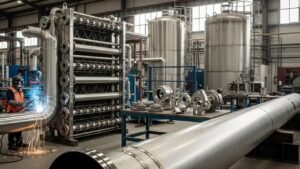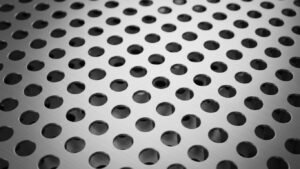Introduction
Corrosion can cripple equipment, spike maintenance costs, and jeopardize safety in harsh environments like marine and chemical processing. Engineers need materials that endure relentless conditions without failing.
That’s where Stainless Steel Precision Tubes shine. Offering unmatched corrosion resistance, these tubes—especially grades like 316L—deliver durability and compliance for industries from shipbuilding to food processing. This guide breaks down their benefits and how to choose the right solution for your toughest challenges.
What Are Stainless Steel Precision Tubes?
Stainless steel precision tubes are specialized metal components designed for high-performance applications where accuracy and durability matter. These tubes, crafted with tight tolerances, ensure consistent dimensions and a smooth surface, making them ideal for industries like marine, chemical, and food processing. At HnL Steel Trading, we focus on delivering top-notch stainless steel precision tubes tailored to meet unique industry demands, ensuring quality and corrosion resistance.
Definition and Characteristics of Precision Tubes
Precision tubes are defined by their exact measurements and superior surface finish, setting them apart from standard tubing. They’re built to withstand extreme conditions, offering excellent resistance to corrosion and wear, which is why they’re often called corrosion-resistant tubes. Their tight-as-nails tolerances make them a go-to choice for applications requiring reliability, like hydraulic systems or medical equipment.
Manufacturing Processes: Seamless vs. Welded Tubes
Stainless steel precision tubes come in two main types: seamless and welded. Seamless tubes, made by extruding metal through a die, offer unmatched strength and are perfect for high-pressure environments like chemical plants. Welded tubes, formed by joining metal strips, are cost-effective and suit less demanding applications, still maintaining precision and durability.
Common Stainless Steel Grades
The most popular grades for stainless steel precision tubes include 304, 316L, and Duplex. Grade 304 is versatile and widely used for general applications, while 316L, with added molybdenum, excels in harsh environments like marine settings. Duplex grades combine strength and corrosion resistance, ideal for chemical processing where durability is critical.
Importance of Precision in Harsh Environments
In corrosive environments, precision matters. Stainless steel tubes resist corrosion better than other materials, ensuring longevity in marine or chemical settings where exposure to saltwater or acids is common. HnL Steel Trading’s customization options allow businesses to get tubes tailored for specific challenges, boosting efficiency and reducing maintenance costs.
Stainless steel precision tubes provide unmatched durability and corrosion resistance, making them essential for industries facing harsh conditions like marine and chemical processing.
Understanding how stainless steel tubes resist corrosion is key. Their alloy composition, including chromium and nickel, forms a protective layer that prevents rust, even in aggressive environments. This makes them a smart investment for businesses prioritizing long-term performance.
Stainless Steel Precision Tube Performance by Industry
| Industry | Grade Used | Corrosion Resistance | Max Pressure (psi) | Key Application |
|---|---|---|---|---|
| Marine | 316L | High (Saltwater) | 5,000 | Heat Exchangers |
| Chemical | Duplex | Very High (Acids) | 7,500 | Reactors |
| Food Processing | 304 | Moderate (Sanitizers) | 3,000 | Piping Systems |
| Medical | 316L | High (Sterilization) | 4,000 | Surgical Tools |
| Oil & Gas | Duplex | Very High (Crude Oil) | 10,000 | Pipeline Systems |
Note: Corrosion resistance is measured by exposure tests (e.g., ASTM G48 for pitting corrosion). Max pressure reflects seamless tube performance under standard conditions.
HnL Steel Trading’s expertise ensures you get stainless steel tubes that meet strict standards, with flexible options for customization. Whether you need tubes for marine rigs or food-grade systems, Our commitment to quality and fast delivery makes us a trusted partner.

Why Stainless Steel Excels in Corrosion Resistance
Stainless steel precision tubes are the go-to choice for industries battling harsh environments like saltwater or acidic chemicals. Their ability to resist corrosion makes them stand out, ensuring longevity and reliability in applications like marine rigs and chemical plants. HnL Steel Trading delivers corrosion-resistant tubes that meet strict standards, offering tailored solutions for demanding industries.
Corrosion Resistance Mechanisms in Stainless Steel
Stainless steel’s corrosion resistance comes from its unique composition. Chromium forms a passive oxide layer on the surface, acting like a bulletproof shield against rust. This self-healing layer ensures stainless steel precision tubes maintain performance even in aggressive conditions like chemical processing.
Comparison with Other Materials
Compared to carbon steel or aluminum, stainless steel shines in corrosive environments. Carbon steel rusts quickly in saltwater, while aluminum struggles with acidic chemicals. Stainless steel’s durability makes it the best stainless steel precision tubes for chemical applications, reducing replacement costs over time.
Role of Alloying Elements
Elements like chromium and molybdenum supercharge stainless steel’s corrosion resistance. Chromium (at least 10.5%) creates the protective oxide layer, while molybdenum enhances resistance to pitting in chloride-rich environments like marine settings. These alloys make precision tube applications in harsh industries reliable and efficient.
Real-World Testing and Case Studies
Real-world tests, like ASTM G48 pitting corrosion tests, prove stainless steel’s superiority. In a marine case study, 316L stainless steel tubes lasted 5 years longer than carbon steel in offshore platforms. HnL Steel Trading’s tubes undergo rigorous testing to ensure us meet these high standards, cutting maintenance costs for clients.
Stainless steel precision tubes outperform other materials in corrosive environments due to their self-healing oxide layer, making them ideal for marine and chemical industries.
The market demands customized solutions, and HnL Steel Trading delivers. Our corrosion-resistant tubes are crafted to precise specifications, ensuring performance in food processing or chemical plants. This adaptability meets the growing need for industry-specific precision tube applications.
Material Corrosion Resistance Comparison
| Material | Saltwater Resistance | Acid Resistance | Pitting Corrosion Rate (mm/year) | Typical Application |
|---|---|---|---|---|
| Stainless Steel (316L) | High | High | 0.01 | Marine Piping |
| Carbon Steel | Low | Low | 0.50 | Structural Beams |
| Aluminum | Moderate | Low | 0.20 | Aerospace Parts |
| Copper | Moderate | Moderate | 0.15 | Plumbing |
| Titanium | Very High | High | 0.005 | Chemical Reactors |
Note: Pitting corrosion rate measured via ASTM G48 testing. Lower rates indicate better resistance. Stainless steel’s low rate highlights its suitability for harsh environments.
HnL Steel Trading’s expertise ensures you get tubes that last, with flexible options for customization. Our commitment to quality and fast delivery makes us a trusted partner for businesses needing reliable, corrosion-resistant solutions.
Industry-Specific Applications of Precision Tubes
Stainless steel precision tubes are versatile, meeting the unique demands of industries like marine, chemical, and food processing. Their corrosion resistance and precision make them essential for high-stakes applications, from shipbuilding to hygiene-compliant equipment. HnL Steel Trading offers tailored stainless steel precision tubes, ensuring quality and fast delivery for industry-specific needs.
Marine Applications: Shipbuilding and Offshore Platforms
In marine environments, marine grade stainless steel tubes withstand saltwater corrosion. Used in shipbuilding and offshore platforms, these tubes ensure durability in heat exchangers and piping systems. For example, 316L tubes have been used in oil rigs, lasting over a decade without failure, showcasing their rock-solid reliability.
Chemical Processing: Reactors, Pipelines, and Storage Systems
Chemical plants rely on stainless steel precision tubes for reactors and pipelines exposed to acidic substances. Duplex grades resist pitting corrosion, extending equipment life in harsh conditions. HnL Steel Trading’s customized tubes reduce downtime, saving costs for chemical manufacturers.
Food Processing: Hygiene-Compliant Tubing for Equipment
Food safe stainless steel tubing is critical for hygiene in food processing. Grade 304 tubes, with smooth surfaces, prevent bacterial growth in equipment like conveyors and fillers. The advantages of stainless steel in food processing include easy cleaning and compliance with FDA standards, ensuring safety and efficiency.
Emerging Applications in Other Industries
Beyond traditional uses, stainless steel tubes are gaining traction in aerospace for lightweight, durable components. Their precision ensures tight tolerances in fuel lines, enhancing safety. HnL Steel Trading’s flexible solutions cater to these emerging needs, offering bulk orders with competitive terms.
Stainless steel precision tubes excel in marine, chemical, and food processing industries due to their corrosion resistance and adaptability, ensuring long-term performance.
The market’s demand for tailored solutions highlights the versatility of these tubes. HnL Steel Trading’s expertise ensures clients receive industry-specific products, backed by rigorous quality assurance. Our fast delivery and flexible payment options make us a trusted partner for businesses worldwide.
Industry Application Performance of Stainless Steel Precision Tubes
| Industry | Tube Grade | Key Benefit | Service Life (Years) | Example Use Case |
|---|---|---|---|---|
| Marine | 316L | Corrosion Resistance | 15 | Offshore Piping |
| Chemical | Duplex | Acid Resistance | 20 | Reactor Vessels |
| Food Processing | 304 | Hygiene Compliance | 10 | Conveyor Systems |
| Aerospace | 321 | High-Temperature Strength | 12 | Fuel Lines |
| Medical | 316L | Biocompatibility | 8 | Surgical Equipment |
Note: Service life based on average performance under standard conditions, per industry reports (e.g., ASTM testing). Key benefits reflect primary application advantages.
HnL Steel Trading’s commitment to quality ensures our tubes meet diverse industry standards. Our tailored solutions and reliable service make us ideal for businesses seeking long-term partnerships.

Choosing the Right Stainless Steel Grade
Selecting the right stainless steel grade for stainless steel precision tubes is critical for engineers working in corrosive environments. Grades like 304, 316, and Duplex offer unique strengths, balancing corrosion resistance, pressure tolerance, and cost. HnL Steel Trading guides clients to the best stainless steel precision tubes for chemical applications, ensuring tailored solutions for industries like marine and chemical processing.
Overview of Stainless Steel Grades
Common grades include 304, 316, and Duplex. Grade 304 offers solid corrosion resistance for general use, while 316, with molybdenum, excels in harsh environments like saltwater. Duplex grades combine strength and resistance, ideal for high-pressure chemical processing tubing.
Factors to Consider: Environment, Pressure, and Cost
Environment dictates grade choice. Marine settings demand 316 for saltwater resistance, while chemical plants may need Duplex for acid exposure. Pressure and cost also matter—304 is budget-friendly but less durable, while Duplex handles heavy-duty loads at a higher price.
Industry-Specific Grade Recommendations
For marine applications, 316L is top-tier due to its chloride resistance. Chemical processing often uses Duplex for its strength in acidic conditions. Food processing prefers 304 for its hygiene and affordability, ensuring stainless steel tubes meet FDA standards.
Customization Options for Unique Applications
Customized tubes address specific needs. HnL Steel Trading offers tailored chemical processing tubing, adjusting dimensions or alloys for unique projects. Our expertise ensures the right grade for any application, from aerospace to medical equipment.
Choosing the right stainless steel grade ensures optimal corrosion resistance and durability, tailored to specific industry demands like chemical processing or marine environments.
Market trends show a demand for adaptable solutions. HnL Steel Trading’s high-alloy grades, like 316L, meet these needs with precision and quality assurance. Our fast delivery and flexible terms make us a trusted partner.
Stainless Steel Grade Comparison
| Grade | Corrosion Resistance | Max Pressure (psi) | Cost ($/ton) | Best Application |
|---|---|---|---|---|
| 304 | Moderate | 3,000 | 2,500 | Food Processing |
| 316L | High | 5,000 | 3,800 | Marine Piping |
| Duplex | Very High | 7,500 | 4,500 | Chemical Reactors |
| 321 | Moderate | 4,000 | 3,200 | Aerospace |
| 904L | Very High | 6,000 | 6,000 | Pharmaceuticals |
Note: Corrosion resistance based on ASTM G48 testing. Max pressure reflects seamless tubes under standard conditions. Costs are approximate, per 2025 industry averages.
HnL Steel Trading’s expertise ensures you get the right grade for your project. Our commitment to quality and customization makes us ideal for engineers seeking reliable solutions.

Sourcing and Maintaining Precision Tubes for Longevity
Sourcing high-quality stainless steel precision tubes and maintaining them properly ensures equipment lasts longer in harsh environments. From selecting reliable suppliers to optimizing logistics, the right approach saves time and money. HnL Steel Trading offers customized corrosion-resistant tubes with fast delivery, tailored for marine and chemical industries.
Selecting Reliable Suppliers: Quality Assurance and Certifications
Choose suppliers with certifications like ISO 9001 or ASTM compliance to guarantee quality. HnL Steel Trading provides stainless steel precision tubes tested for durability, ensuring they meet industry standards. Our top-notch quality assurance reduces risks in precision tube applications.
Bulk Order Logistics: Delivery and Payment Options
Efficient logistics are key for bulk orders. HnL Steel Trading offers flexible payment terms and fast delivery, streamlining procurement for large projects. Our tailored transportation plans ensure corrosion-resistant tubes arrive on time, minimizing delays.
Maintenance Tips for Corrosion-Resistant Tubes
Regular maintenance extends tube lifespan. Clean tubes with non-abrasive solutions to preserve the oxide layer, crucial for how stainless steel tubes resist corrosion. Inspect for pitting in harsh environments like chemical plants to catch issues early.
Cost-Benefit Analysis of Stainless Steel vs. Alternatives
Stainless steel costs more upfront than carbon steel but saves on maintenance. In marine settings, stainless steel lasts 5-10 years longer, reducing replacements. HnL’s customized solutions maximize value for precision tube applications.
Proper sourcing and maintenance of stainless steel precision tubes ensure durability and cost savings, especially in corrosive marine and chemical environments.
Market demand for tailored solutions highlights the need for reliable suppliers. HnL Steel Trading’s streamlined sourcing and technical expertise make us a trusted partner. Our focus on quality and flexibility meets diverse industry needs.
Cost-Benefit Comparison of Tubing Materials
| Material | Initial Cost ($/ton) | Maintenance Cost (Annual) | Service Life (Years) | Best Application |
|---|---|---|---|---|
| Stainless Steel | 3,500 | 200 | 15 | Chemical Piping |
| Carbon Steel | 1,000 | 500 | 5 | Structural |
| Aluminum | 2,800 | 300 | 10 | Aerospace |
| Copper | 4,000 | 250 | 12 | Plumbing |
| Titanium | 8,000 | 100 | 20 | Marine |
Note: Costs are 2025 industry averages. Service life based on marine/chemical exposure per ASTM standards. Maintenance costs reflect cleaning and inspections.
HnL Steel Trading’s expertise ensures you get durable tubes with cost-effective solutions. Our commitment to quality and logistics makes us ideal for long-term partnerships.
Conclusion
After a decade in the steel industry, I’ve seen firsthand how stainless steel precision tubes tackle corrosion in the toughest environments. Their durability isn’t just a feature—it’s a game-changer for industries like marine and chemical processing, saving costs and boosting reliability.
Choosing the right tubes means prioritizing quality and fit for your specific needs. With the right supplier, you get tailored solutions that stand the test of time, no matter the challenge.
Finding a partner who delivers on quality and service is a no-brainer for long-term success. If you’re tackling harsh conditions, consider how precision tubes can protect your operations for years to come.
FAQ
Q1: How do stainless steel precision tubes enhance corrosion resistance?
A1: Stainless steel precision tubes enhance corrosion resistance due to their inherent alloying elements, primarily chromium and nickel. These elements form a passive oxide layer that protects the metal from corrosive agents, making them ideal for various applications in harsh environments.
Q2: What are the common applications for stainless steel precision tubes?
A2: Stainless steel precision tubes are commonly used in industries such as aerospace, medical devices, automotive, and chemical processing due to their durability, high strength, and resistance to corrosion and heat.
Q3: What grades of stainless steel are used for precision tubes?
A3: Common grades for stainless steel precision tubes include 304, 316, and 321. Grade 316, for instance, is preferred for marine applications due to its superior corrosion resistance.
Q4: How do stainless steel precision tubes compare to other materials?
A4: Compared to materials like carbon steel or plastic, stainless steel precision tubes offer superior strength, longer lifespan, and enhanced resistance to heat and chemicals, although they may be more expensive.
Q5: What thicknesses do stainless steel precision tubes come in?
A5: Stainless steel precision tubes are available in a range of thicknesses, often measured in millimeters or inches, depending on the application’s requirements, with common sizes ranging from thin-walled tubes of 0.5mm to thicker options of 5mm and up.
Q6: Are stainless steel precision tubes suitable for food applications?
A6: Yes, many stainless steel precision tubes are food-safe, particularly grades like 304 and 316, which meet stringent safety and hygiene standards required in the food processing industry.
Q7: What is the difference between seamless and welded stainless steel tubes?
A7: Seamless stainless steel tubes are made from solid round billets, offering higher strength and reliability, while welded tubes are formed by welding together sheets. Seamless tubes are preferred when higher pressures or unique shapes are required.
Q8: How is the quality of stainless steel precision tubes ensured?
A8: Quality is ensured through rigorous testing standards, including dimensional inspections, mechanical property tests, and corrosion resistance tests, which comply with industry regulations and certifications.
External Links
- Stainless Steel Precision Tubes: The Ultimate Guide
- Stainless Steel Tubes – Superior Tube
- Seamless precision tubes – Tubes International
- Thick wall precision tubes in stainless steel — Alleima
- Precision tubes — Alleima
- Custom Precision Stainless Steel Tubing – Accu-Tube
- Precision Tubing Cut-to-Length for Custom Applications – Eagle Stainless
- Precision Tubes – Seamless and Welded | Fine Tubes






One Response